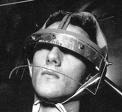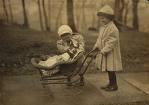
Welcome to the ezine produced by SGI Buddhists that prompts the positive, kindles the constructive, highlights the hopeful and leaves you feeling - well, up!

 Most of us meet with Failure in the course of our lives – along with its best friends Guilt, Despair and Shame.
Most of us meet with Failure in the course of our lives – along with its best friends Guilt, Despair and Shame.
Bruce Grierson reports on a new theory rapidly gaining ground which argues that adversity, setbacks and even trauma may actually be necessary for people to be happy, successful and fulfilled.

Have our digital-age minds reached maximum information processing capacity? Scientific research suggests that relentless mental multi-tasking and information overload are affecting our ability to feel compassion, empathy and altruism. John Naish investigates.
 We can all get stuck in
schemas - commonly known as life traps.
We can all get stuck in
schemas - commonly known as life traps.
Invariably cemented in childhood, schemas are negative beliefs about the self that lead to self-defeating life patterns in adulthood. Hannah Borno looks at how it's possible to move on from our schemas and create new lives.
 Is the stress-fuelled modern work ethic of striving and
competing threatening to wreck our children’s lives? Tom Hodgkinson of The
Idler reckons that we are too much in our children’s faces and welcomes us to
the school of inactive parenting.
Is the stress-fuelled modern work ethic of striving and
competing threatening to wreck our children’s lives? Tom Hodgkinson of The
Idler reckons that we are too much in our children’s faces and welcomes us to
the school of inactive parenting.

Julie Burchill argues that volunteering is a more effective cure for depression than therapy
 It’s time, argues Peter Marshall, that therapists shifted
their focus from the individual to the global, and addressed human suffering
and social injustice in the wider world
It’s time, argues Peter Marshall, that therapists shifted
their focus from the individual to the global, and addressed human suffering
and social injustice in the wider world

Psychologist Bruce Wampold created shockwaves when his research revealed that the success of therapeutic techniques was less than 1%.
What mattered was whether or not the client trusted the therapist. Oliver Burkeman explores the implications of this for self-help systems that insist they can change your life.

